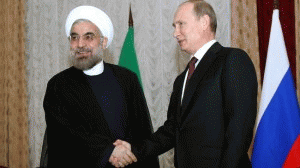Reprinted from Consortium News

Iranian President Hassan Rouhani (left) shakes hands with Russian President Vladimir Putin at the Shanghai Cooperation Organization summit in the Kyrgyz capital of Bishkek on Sept. 13, 2013.
(Image by (Photo credit: Press TV)) Details DMCA
Russian President Vladimir Putin has thrown U.S. policymakers what amounts to a lifeline to pull them out of the quicksand that is the Syrian war, but Official Washington's neocons and the mainstream U.S. news media are growling about Putin's audacity and challenging his motives.
For instance, The New York Times' lead editorial on Monday accused Putin of "dangerously building up Russia's military presence" in Syria, even though Putin's stated goal is to help crush the Sunni jihadists in the Islamic State and other extremist movements.
The Times then reprises the bizarre neocon argument that the best way to solve the threat from the Islamic State, Al Qaeda and other jihadist forces is to eliminate Syrian President Bashar al-Assad and his military who have been the principal obstacles to an outright victory by the Sunni terrorist groups.
The dreamy Times/neocon prescription continues to be that "regime change" in Damascus would finally lead to the emergence of the mythical "moderate" rebels who would somehow prevail over the far more numerous and far better armed extremists. This perspective ignores the fact that after a $500 million training project for these "moderates," the U.S. military says four or five fighters are now on the battlefield inside Syria. In other words, the members of this U.S.-trained brigade can be counted on the fingers of one hand.
But rather than rethink Official Washington's goofy "group think" on Syria -- or provide readers a fuller history of the Syrian conflict -- the Times moves on to blame Putin for the mess.
"No one should be fooled about Russia's culpability in Syria's agony," the Times writes. "Mr. Putin could have helped prevent the fighting that has killed more than 250,000 Syrians and displaced millions more, had he worked with other major powers in 2011 to keep Mr. Assad from waging war on his people following peaceful antigovernment protests. " Mr. Assad would probably be gone without the weapons aid and other assistance from Russia and Iran."
This "group think" ignores the early role of Sunni extremists in killing police and soldiers and thus provoking the harsh retaliation that followed. But the Syrian narrative, according to The New York Times, is that the "white-hat" protesters were simply set upon by the "black-hat" government.
The Times' simplistic storyline fits neatly with what the influential neoconservatives want the West to believe, since the neocons have had Syria on their "regime change" list, alongside Iraq and Iran, since the list was compiled as part of Israeli leader Benjamin Netanyahu's 1996 political campaign. The Times' narrative also leaves out the crucial role of Turkey, Saudi Arabia, Qatar and other U.S. "allies" in supporting Al Qaeda and its Islamic State spinoff.
Bush's Unaccounted-for Cash
Further complicating Official Washington's let's-blame-Putin Syrian narrative is the unintended role of President George W. Bush and the U.S. military in laying the groundwork for these brutal Sunni extremist movements through the invasion of Iraq last decade. After all, it was only in reaction to the U.S. military presence that "Al Qaeda in Iraq" took root in Iraqi and then Syrian territory.
Not only did the ouster and execution of Sunni leader Saddam Hussein alienate the region's Sunnis, but Bush's desperation to avert an outright military defeat in Iraq during his second term led him to authorize the payment of billions of dollars to Sunni fighters to get them to stop shooting at American soldiers and to give Bush time to negotiate a U.S. troop withdrawal.
Beginning in 2006, those U.S. payments to Sunni fighters to get them to suspend their resistance were central to what was then called the "Sunni Awakening." Though the program preceded Bush's "surge" of troops in 2007, the bought-and-paid-for truce became central to what Official Washington then hailed as the "successful surge" or "victory at last."
Besides the billions of dollars paid out in pallets of U.S. cash to Sunni insurgents, Bush's "surge" cost the lives of another 1,000 U.S. soldiers and killed a countless number of Iraqis, many just going about their daily lives until they were blown apart by powerful American munitions. [See, for example, the "Collateral Murder" video leaked by Pvt. Bradley/Chelsea Manning]
But what the U.S. intelligence community is only now assessing is the collateral damage caused by the bribes that the Bush administration paid to Sunni insurgents. Some of the cash appears to have become seed money for the transformation of "Al Qaeda in Iraq" into the Islamic State as Sunnis, who continued to be disenfranchised by Iraq's Shiite-dominated government, expanded their sectarian war into Syria.
Besides the Iraqi Sunnis, Syria's secular government, with Assad and other key leaders from the Alawite branch of Shiite Islam, also was set upon by home-grown Sunni extremists and foreign jihadists, some of whom joined the Islamic State but mostly coalesced around Al Qaeda's Nusra Front and other radical forces. Though the Islamic State had originated as "Al Qaeda in Iraq" (or AQI), it evolved into an even more bloodthirsty force and, in Syria, split off from Al Qaeda central.
(Note: You can view every article as one long page if you sign up as an Advocate Member, or higher).





